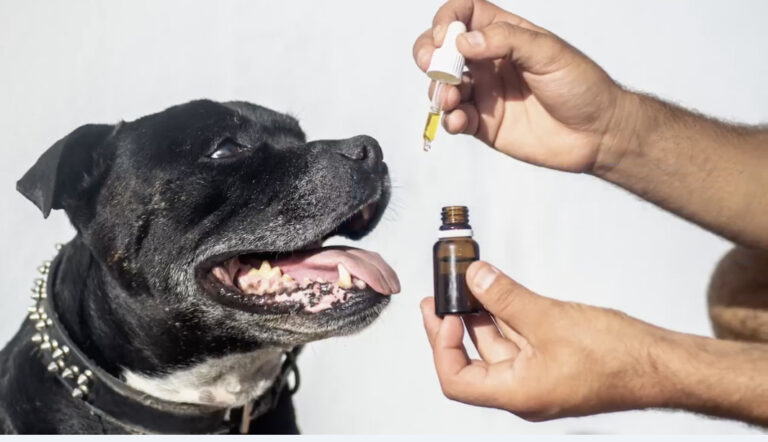How CBD Oil Can Alleviate Allergies in Dogs
If you’re a pet owner, watching your dog suffer from allergies can be distressing. Their constant scratching, biting, and discomfort are not something you want to see. Fortunately, CBD oil is emerging as a promising solution for many canine conditions, including allergies. This guide delves into how CBD oil can help alleviate allergies in dogs, providing relief for your furry friend.
Understanding Dog Allergies

Before discussing the role of CBD oil, it’s crucial to understand what allergies in dogs look like. Dogs, like humans, can suffer from a range of allergic reactions, which are often responses to environmental irritants, foods, or flea bites. Common symptoms include:
- Excessive scratching or licking
- Red, inflamed skin
- Sneezing and runny eyes
- Ear infections
These symptoms occur when a dog’s immune system overreacts to a substance, releasing histamines that cause these discomforting signs.
What is CBD Oil?
Cannabidiol (CBD) oil is derived from the cannabis plant but does not produce the psychoactive effects commonly associated with marijuana, which is due to another compound, THC. CBD oil is gaining ground in the wellness community for its potential to support health and well-being, including in pets. It interacts with the endocannabinoid system (ECS) present in all mammals, helping to maintain balance in the body and modulate responses to pain, anxiety, and inflammation.
CBD Oil for Dog Allergies
CBD oil can be a natural method to manage the symptoms of allergies in dogs for several reasons:
- Anti-inflammatory Properties: CBD’s ability to reduce inflammation is one of its most valued benefits. By lowering skin inflammation, CBD can relieve some of the discomfort caused by allergic reactions.
- Immune System Modulation: CBD may help modulate the immune system, reducing the hyperactive response that leads to severe allergic reactions.
- Skin Health: Applying CBD oil topically can improve skin health, reducing dryness and irritation, which helps in healing the skin barrier damaged by allergies.
How to Use CBD Oil for Dog Allergies
When considering CBD oil for your dog’s allergies, it’s important to proceed with caution:
- Consult Your Vet: Always discuss with your veterinarian before starting any new treatment. They can provide guidance based on your dog’s specific health needs.
- Quality Matters: Invest in high-quality, lab-tested CBD oil designed specifically for pets to ensure it is safe and effective.
- Dosage Is Key: Start with a low dose and monitor your dog’s response. Your vet can help determine the right dosage.
Real-Life Success Stories
Many dog owners have reported positive changes in their pets’ allergy symptoms after using CBD oil. For instance, a Labrador Retriever named Max started using CBD oil as a supplement, and his owner noticed a significant reduction in his skin irritation and scratching within a few weeks.
Potential Side Effects and Considerations
While CBD is generally considered safe for dogs, some may experience minor side effects such as drowsiness or changes in appetite. Monitoring your pet closely when introducing any new treatment is crucial.
Selecting the Right CBD Product
When it comes to choosing CBD oil for your dog, the variety of options available can be overwhelming. Here are some key factors to consider to ensure you’re picking the best product:
- Source: Look for CBD oil derived from organically grown hemp. This minimizes the risk of contaminants such as pesticides that can exacerbate allergies.
- Spectrum: Full-spectrum CBD oil contains a range of cannabinoids that work together to enhance the therapeutic effects, a phenomenon known as the “entourage effect.” However, if your dog is sensitive to very low THC levels, broad-spectrum or isolate options may be more appropriate.
- Certifications: Opt for products that have been third-party lab tested. Reputable companies will provide a Certificate of Analysis (COA) that confirms the product’s cannabinoid content and purity.
Administering CBD Oil
Administering CBD oil can be straightforward if you follow these tips:
- Direct to Mouth: The most direct method is to apply CBD oil directly into your dog’s mouth using a dropper. This method ensures that they receive the entire dosage.
- With Food: If your dog dislikes the taste or is hesitant to take it directly, you can mix CBD oil into their food. Ensure the food is enticing enough to ensure they consume the full dose.
- Topical Application: For localized allergic reactions, such as irritated skin, applying CBD oil topically can provide targeted relief. Ensure the product is safe for external use.
Monitoring Results
Once you begin administering CBD oil, it’s essential to monitor your dog’s response:
- Track Symptoms: Keep a diary of your dog’s symptoms and any noticeable changes. This can help you determine the effectiveness of the treatment and any need for dosage adjustments.
- Observe Behavior: Note any changes in behavior or activity levels. While some sedation can be normal, particularly with higher doses, significant lethargy or changes in appetite should prompt a consultation with your veterinarian.
- Adjust as Needed: Depending on your observations and your vet’s advice, you may need to adjust the dosage or frequency to better suit your dog’s needs.
Read Also : Are CBD dog treats safe for puppies?
Frequently Asked Questions
To further assist you, here are answers to some common questions about using CBD oil for dog allergies:
- How long does it take for CBD oil to affect dog allergies? Typically, it can take a few days to a few weeks to see noticeable benefits from CBD oil. Consistency is key when using CBD for allergies.
- Can CBD oil be used alongside other allergy treatments? Yes, CBD oil can be part of a comprehensive allergy treatment plan. However, discuss any combined treatments with your veterinarian to avoid interactions.
- Are there any dogs that shouldn’t use CBD oil? While CBD is safe for most dogs, those with liver issues or pregnant dogs should not use CBD without veterinary guidance.
Conclusion
Embracing CBD oil as a treatment for your dog’s allergies can be a beneficial addition to their health regime. With its natural anti-inflammatory properties and capability to support immune system balance, CBD offers a holistic approach to managing allergies. Remember, the key to success with CBD oil is choosing a high-quality product, starting with a safe dosage, and adjusting based on your dog’s specific reactions and the advice of your veterinarian. By doing so, you can help ensure your dog lives a happier, more comfortable life despite their allergies.







